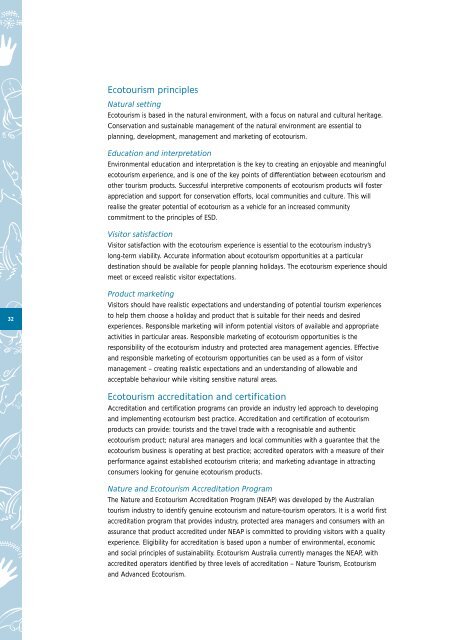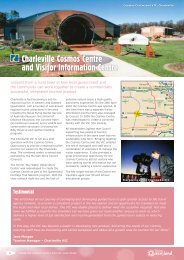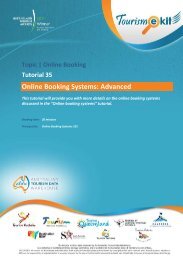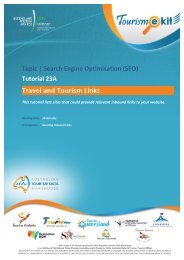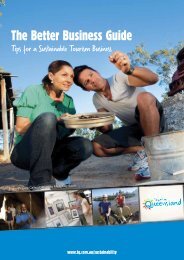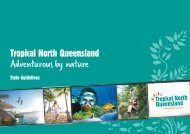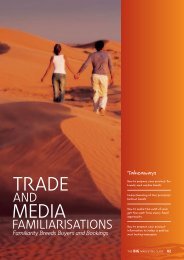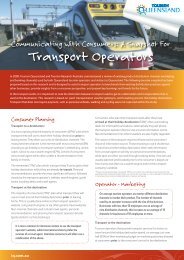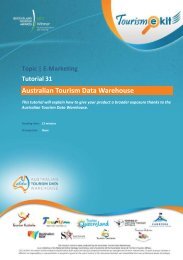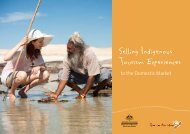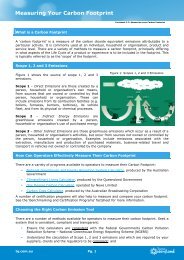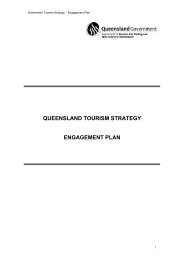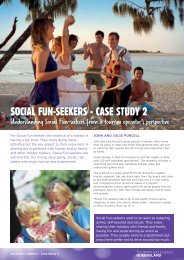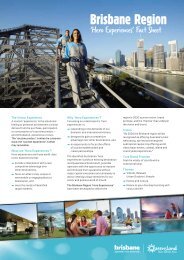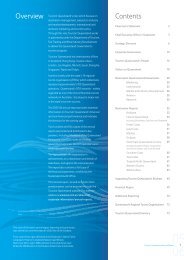Queensland Ecotourism Plan 2003-2008 - Tourism Queensland
Queensland Ecotourism Plan 2003-2008 - Tourism Queensland
Queensland Ecotourism Plan 2003-2008 - Tourism Queensland
Create successful ePaper yourself
Turn your PDF publications into a flip-book with our unique Google optimized e-Paper software.
<strong>Ecotourism</strong> principles<br />
Natural setting<br />
<strong>Ecotourism</strong> is based in the natural environment, with a focus on natural and cultural heritage.<br />
Conservation and sustainable management of the natural environment are essential to<br />
planning, development, management and marketing of ecotourism.<br />
Education and interpretation<br />
Environmental education and interpretation is the key to creating an enjoyable and meaningful<br />
ecotourism experience, and is one of the key points of differentiation between ecotourism and<br />
other tourism products. Successful interpretive components of ecotourism products will foster<br />
appreciation and support for conservation efforts, local communities and culture. This will<br />
realise the greater potential of ecotourism as a vehicle for an increased community<br />
commitment to the principles of ESD.<br />
Visitor satisfaction<br />
Visitor satisfaction with the ecotourism experience is essential to the ecotourism industry’s<br />
long-term viability. Accurate information about ecotourism opportunities at a particular<br />
destination should be available for people planning holidays. The ecotourism experience should<br />
meet or exceed realistic visitor expectations.<br />
32<br />
Product marketing<br />
Visitors should have realistic expectations and understanding of potential tourism experiences<br />
to help them choose a holiday and product that is suitable for their needs and desired<br />
experiences. Responsible marketing will inform potential visitors of available and appropriate<br />
activities in particular areas. Responsible marketing of ecotourism opportunities is the<br />
responsibility of the ecotourism industry and protected area management agencies. Effective<br />
and responsible marketing of ecotourism opportunities can be used as a form of visitor<br />
management – creating realistic expectations and an understanding of allowable and<br />
acceptable behaviour while visiting sensitive natural areas.<br />
<strong>Ecotourism</strong> accreditation and certification<br />
Accreditation and certification programs can provide an industry led approach to developing<br />
and implementing ecotourism best practice. Accreditation and certification of ecotourism<br />
products can provide: tourists and the travel trade with a recognisable and authentic<br />
ecotourism product; natural area managers and local communities with a guarantee that the<br />
ecotourism business is operating at best practice; accredited operators with a measure of their<br />
performance against established ecotourism criteria; and marketing advantage in attracting<br />
consumers looking for genuine ecotourism products.<br />
Nature and <strong>Ecotourism</strong> Accreditation Program<br />
The Nature and <strong>Ecotourism</strong> Accreditation Program (NEAP) was developed by the Australian<br />
tourism industry to identify genuine ecotourism and nature-tourism operators. It is a world first<br />
accreditation program that provides industry, protected area managers and consumers with an<br />
assurance that product accredited under NEAP is committed to providing visitors with a quality<br />
experience. Eligibility for accreditation is based upon a number of environmental, economic<br />
and social principles of sustainability. <strong>Ecotourism</strong> Australia currently manages the NEAP, with<br />
accredited operators identified by three levels of accreditation – Nature <strong>Tourism</strong>, <strong>Ecotourism</strong><br />
and Advanced <strong>Ecotourism</strong>.


